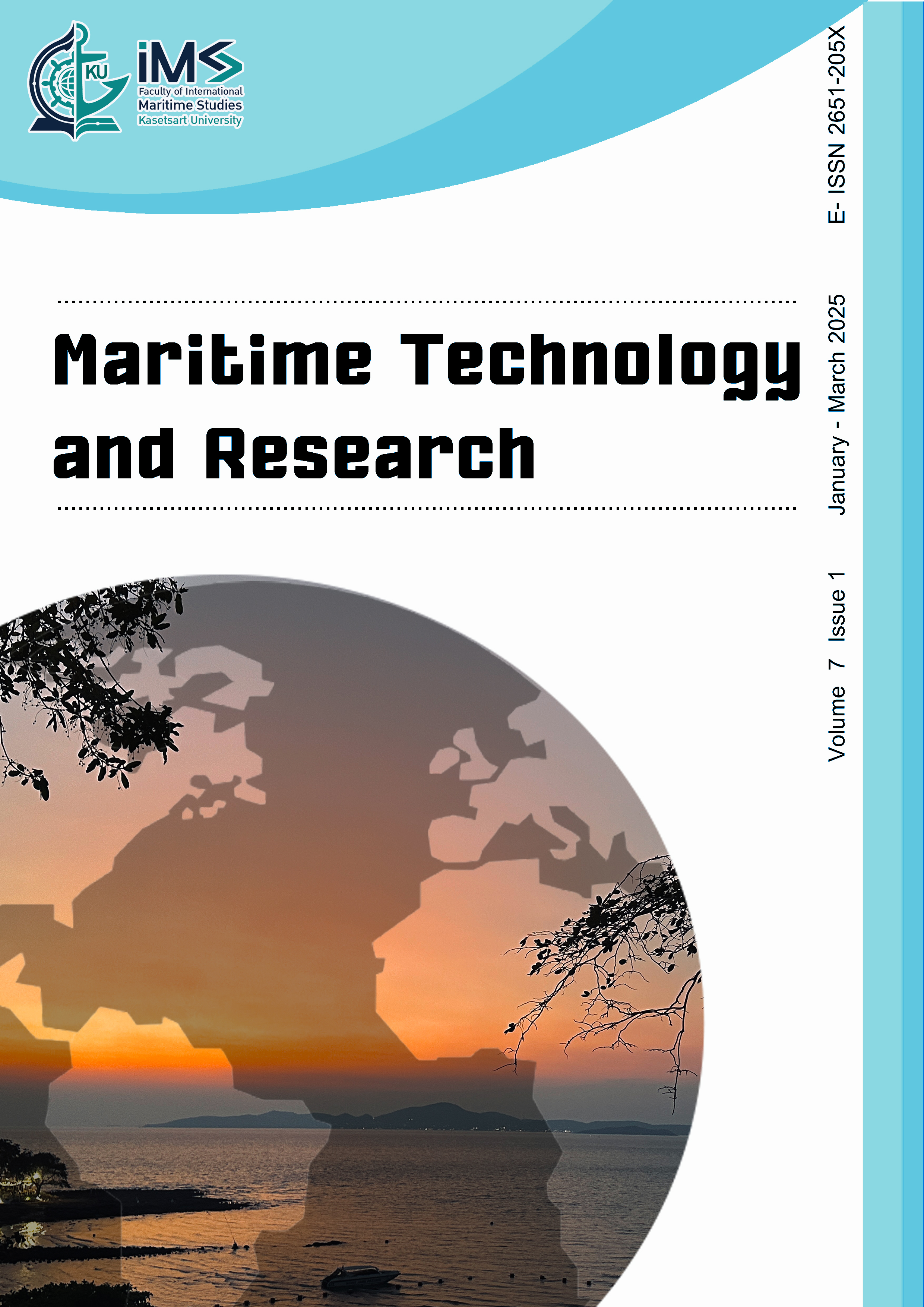Evaluation of ship turnaround time and cargo trade delays of Nigerian ports in the post privatization regime
DOI:
https://doi.org/10.33175/mtr.2025.270891Keywords:
Maritime logistics; Ship turnaround time; Cargo dwell time; Logistics performanceAbstract
The study evaluated the ship turnaround time and cargo trade delays of Nigerian ports in the post privatization regime. The objectives of the study were, among other things, to investigate the existence of delays in ship turnaround time (STRT) operations and processing of shipping (cargo) trade in Nigerian seaports. The study used ex-facto research design, employing secondary data sourced from different sources as explained later in the work. The Net Output Model approach for estimating value of time lost, the paired sample-test, and the log-linear multiple regression analysis methods were used to analyze the data obtained. It was found that there exists disproportionate levels of delay in ship turnaround time operations in the individual seaports of Nigeria, such that, in each of the Onne, Lagos Apapa, Warri, Rivers, and Calabar ports, the delay encountered by ship operators in shipping operations is 1.878, 5.340, 3.470, 2.810, and 2.440 days, respectively. The Nigerian port sector average delay in ship turnaround time operations is 9.20 days. The result of the study also indicated the existence of 9.00, 16.73, 14.10, 15.60, and 13.40 day delays in the processing of shipping trade in each of the Onne, Lagos Apapa, Warri, Rivers, and Calabar ports, respectively. It is recommended that Port Authorities and Terminal operators, in collaboration with the Nigerian Shippers Council, should develop delay reduction policies and strategies in the ports, in order to ensure that trade processing and ship turnaround time operations in Nigerian ports comply with the global benchmark of 1.20 days for ship turnaround time and 4.00 days for shipping trade.
------------------------------------------------------------------------------
Cite this article:
APA Style:
Justice, C.M., Obed, B.N., Ibeawuchi, C.N., & Theophilus, C.N. (2025). Evaluation of ship turnaround time and cargo trade delays of Nigerian ports in the post privatization regime. Maritime Technology and Research, 7(1), 270891. https://doi.org/10.33175/mtr.2025.270891
MDPI Style:
Justice, C.M.; Obed, B.N.; Ibeawuchi, C.N.; Theophilus, C.N. Evaluation of ship turnaround time and cargo trade delays of Nigerian ports in the post privatization regime. Marit. Technol. Res. 2025, 7(1), 270891. https://doi.org/10.33175/mtr.2025.270891
Vancouver Style:
Justice CM, Obed BN, Ibeawuchi CN, Theophilus CN. (2025). Evaluation of ship turnaround time and cargo trade delays of Nigerian ports in the post privatization regime. Marit. Technol. Res. 7(1): 270891. https://doi.org/10.33175/mtr.2025.270891
------------------------------------------------------------------------------
Highlights
- Nigerian ports have been battling issues of port delays which made the ports less attractive with less patronage as prospective port users are made to spend more time and finance in transacting business with Nigerian ports.
- These delays are mostly evident in the Ship Turnaround time (STRT)and Cargo dwell time (CDWT) in Nigerian Ports which are major factors in determining Port Performance globally.
- The study conducted an evaluation of these delay causing factors and was able to estimate the number of extra days ships in Nigerian ports as against global benchmarks of other ports using STRT and CDWT as basic parameters of Port Performance.
- The Apapa Port in Lagos State was deduced to be the Port with highest rate of delay while the Onne Port Complex in Rivers State was deduced to have the least delay in number of days.
- Recommendations were also proffered as to mitigate these delays to make Nigerian ports competitive and more attractive to prospective port users.
References
African Development Bank. (2010). African Development Bank Report. African Development Bank.
Annual Abstract of Statistics. (2016). Annual Abstract of Statistics.
Bichou, K., & Gray, R. (2004). A logistics and supply chain management approach to port performance measurement. Maritime Policy and Management, 31(1), 47-67. https://doi.org/10.1080/0308883032000174454
Carbone, V., & De Martino, M. (2003). The changing role of ports in the supply chain management: An empirical analysis. Maritime Policy and Management, 30(4), 305-320. https://doi.org/10.1080/0308883032000145618
Council of Supply Chain Management Professionals (CSCMP). (2010). Council of Supply Chain Management Professionals (CSCMP).
Eniola, O. J., Njoku I., Oluwatosin F. A., & Okoko, E. (2014). Performance evaluation of Nigerian Ports: Pre and post concession eras. Journal of Civil and Environmental Research, 6(2), 70-85.
Gbolahan, D. I., Omoke ,V., Ojekunle, J. A., & Nwaogbe, O. R. (2021). Assessment of port performance in Nigeria. International Journal of Advances in Engineering and Management, 3(8), 1854-1862. https://doi.org/10.35629/5252-030818541862
Haiwei, L., Weijian, M., Ning Z., & Yufei, F. (2015). Modeling and simulating the operation of the harbor portal crane. Journal of Coastal Research, 73(1), 89-94. https://doi.org/10.2112/SI73-016.1
Lee, E. S., Nam, H. S., & Song, D. W. (2012). Defining maritime logistics and its value in Maritime Logistics. In Song, D. W., & Panayides, P. M. (Eds.). Maritime logistics: A complete guide to effective shipping and port management. Kogan Page.
Nigerian Ports Authority (NPA). (2022). Statistical report. Nigerian Ports Authority.
Nigeria Shippers Council (NSC). (2019). Performance report. Nigeria Shippers Council.
Ndikom, O. B. (2011). Fundamentals of Freight Forwarding Management and Practice in Nigeria. University of Ibadan Press.
Ndikom, O. B., Nwokedi, T. C., Buhari, O. S., & Okeke, K. O. (2017) An appraisal of demurrage policies and charges of maritime operators in Nigerian Seaport Terminals: The shipping industry and economic implications. Naše More, 64(3), 90-99. https://doi.org/10.17818/NM/2017/3.3
Nwokedi, T. C., Ndikom, O. B., Okoroji, L. I., & Nwaorgu, J. (2021). Determinant port-related factors affecting the flow of shipping trade and logistics in Nigerian seaports. LOGI – Scientific Journal on Transport and Logistics,12(1), 261-270. https://doi.org/10.2478/logi-2021-0024
Tuna, O., & Arabelen, G. (2013). Deniz Ulaştırma Lojistiği (Maritime Logistics) (pp. 533-561). In Cerit, A., Deveci, A., & Esmer, S. (Eds.). Denizcilik İşletmeleri Yönetimi (Maritime Business Management). İstanbul, Beta Basım A.Ş.
UNCTAD (2021). Review of Maritime Transport 2011, 2017 and 2022 Editions. United Nations Conference on Trade and Development.
UNCTAD. (2022). Review of Maritime Transport. United Nations Conference on Trade and Development, New York and Geneva.
Wayne, K. T., Man, W. N., & Erika, M. (2014). Port service chains and port performance evaluation. Transportation Research Part E: Logistics and Transportation Review, 69, 236-247. https://doi.org/10.1016/j.tre.2014.05.008
World Bank. (2023). World Bank Annual Report. The World Bank.
Downloads
Published
Issue
Section
Categories
License
Copyright (c) 2024 Maritime Technology and Research

This work is licensed under a Creative Commons Attribution-NonCommercial-NoDerivatives 4.0 International License.
Copyright: CC BY-NC-ND 4.0








